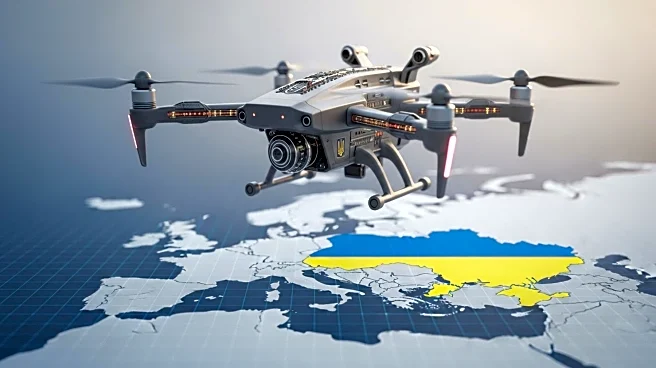What's Happening?
The European Union, under the leadership of Commission President Ursula von der Leyen, has announced a series of defense initiatives aimed at strengthening Europe's autonomy and security. A key component of this strategy is the formation of a 'drone alliance' with Ukraine, backed by a €6 billion ($7 billion) program. This initiative is designed to enhance Ukraine's drone capabilities, which have been pivotal in countering Russian military equipment. Additionally, the EU plans to establish a 'drone wall' to protect its member states from aerial incursions, particularly from Russia. This move comes in response to recent incidents where Russian drones entered Polish airspace, causing damage to residential areas. Von der Leyen emphasized the importance of Europe's eastern flank in maintaining continental security and announced the Eastern Flank Watch project, which includes real-time space surveillance to monitor troop movements.
Why It's Important?
The EU's defense initiatives signify a strategic shift towards greater military independence and resilience against external threats, particularly from Russia. By partnering with Ukraine, the EU aims to leverage Ukraine's advancements in drone warfare to bolster its own defense capabilities. This move is crucial for maintaining stability and security across Europe, especially in light of recent Russian provocations. The establishment of a 'drone wall' and enhanced surveillance measures are expected to deter further incursions and protect EU member states. Furthermore, the financial support for Ukraine, sourced from frozen Russian assets, underscores the EU's commitment to aiding Ukraine while simultaneously applying economic pressure on Russia. These actions could have significant geopolitical implications, potentially altering the balance of power in the region.
What's Next?
The EU's defense strategy is likely to prompt reactions from various stakeholders, including Russia, which may perceive these measures as escalatory. The implementation of the 'drone wall' and surveillance systems will require coordination among EU member states and could lead to increased defense spending. Additionally, the proposed sanctions on Israel for its actions in Gaza may affect EU-Israel relations and could lead to diplomatic tensions. The EU's approach to bypassing internal disagreements to enforce these measures may set a precedent for future policy decisions. As the situation evolves, the EU will need to navigate complex geopolitical dynamics while ensuring the security and stability of its member states.
Beyond the Headlines
The EU's defense initiatives reflect broader trends in international relations, where regional powers are increasingly seeking autonomy and resilience in the face of global threats. The focus on drone technology highlights the growing importance of unmanned systems in modern warfare, which could lead to further innovations and changes in military strategy. The use of frozen Russian assets to support Ukraine raises ethical and legal questions about the handling of such funds, potentially influencing future international financial policies. Additionally, the EU's stance on Israel may have cultural and political ramifications, affecting perceptions of the EU's role in global human rights advocacy.










